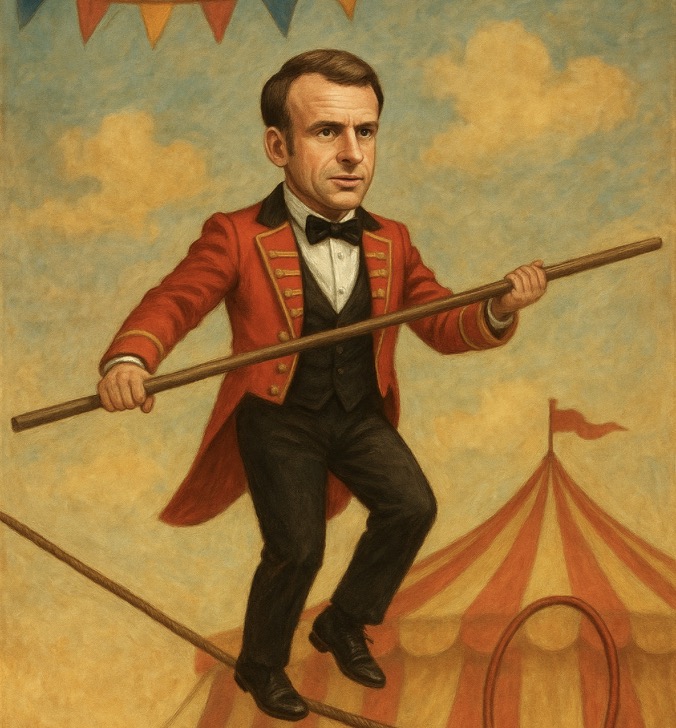In the wake of France’s tumultuous snap legislative elections, President Emmanuel Macron finds himself at a precarious crossroads.
The July 2024 polls, called in a bold bid to consolidate his centrist bloc against the rising tide of the far-right National Rally (RN), backfired spectacularly.
The result? A hung parliament fractured into three major blocs: Macron’s fractured Renaissance alliance, a resilient left-wing New Popular Front (NFP), and the surging RN led by Marine Le Pen. No outright majority emerged, plunging the Fifth Republic into its deepest crisis since the 1958 constitutional overhaul.
With the September 2024 deadline for appointing a new prime minister looming and a budget impasse threatening economic stability, Macron’s room for maneuver has shrunk to three unpalatable paths forward. Each option brims with peril, testing the limits of his pragmatic centrism and the republic’s institutional resilience.
The most immediate gambit lies in naming a new prime minister—a move that could either bridge divides or widen fissures. Macron’s initial choice, centrist ally Michel Barnier, lasted mere weeks before toppling under a no-confidence vote spearheaded by a united left and tacit RN support.
Now, with Barnier’s conservative leanings alienating progressives, the president must recalibrate. Appointing a figure from his own camp seems improbable; the Renaissance party, already diminished, lacks the cohesion to rally a stable government. A moderate leftwinger, perhaps from the Socialist Party or ecologist ranks within the NFP, might offer a veneer of pluralism. Yet this risks unraveling Macron’s signature pension reform, the 2023 hike in retirement age from 62 to 64 that sparked nationwide protests and remains a flashpoint for the left.
Labor unions and NFP firebrands like Jean-Luc Mélenchon have vowed to repeal it, viewing any compromise as a betrayal of their electoral mandate.
Conversely, turning to a “confirmed rightwinger”—say, a Les Républicains stalwart—would ignite fury among the NFP’s 182 deputies, who command a slim plurality in the 577-seat assembly. The left bloc, a fragile coalition of socialists, communists, greens, and Mélenchon’s hard-left La France Insoumise, has already demonstrated its disruptive power.
Such an appointment could provoke immediate censure motions, paralyzing governance. Enter the wildcard: a non-partisan technocrat, untainted by factional baggage. Analysts, including those at the Institut Montaigne think tank, whisper of figures like former European Central Bank official François Villeroy de Galhau or economist Agnès Verdier-Molinié.
This “above-the-fray” approach echoes Italy’s technocratic interludes under Mario Draghi, aiming to forge minimal consensus on the 2025 budget. France’s fiscal woes— a deficit ballooning to 6% of GDP amid post-pandemic recovery and Ukraine aid—demand urgent action. A technocrat could sidestep ideological trench warfare, securing passage for essential spending while Macron regroups for 2027. Yet skeptics warn of democratic erosion: unelected experts governing a polarized nation might fuel populist resentment, handing RN ammunition to decry “elites versus the people.”
If the prime ministerial route falters, Macron’s second arrow is dissolution of the National Assembly and fresh elections—a nuclear option he has telegraphed reluctance to deploy. Under Article 12 of the Constitution, the president can dissolve the lower house once a year, triggering polls within 20 to 40 days.
Macron, who invoked this power just three months prior, faces a 12-month cooldown until spring 2025. Polling from IFOP and Ipsos paints a grim picture: another fragmented outcome seems likeliest, with the NFP hovering at 28-30% support, RN at 33-35%, and Macron’s ensemble at a dismal 20%. The far right, buoyed by Le Pen’s disciplined campaign, could capitalize on voter fatigue, potentially clinching a relative majority and forcing a “cohabitation” government under RN influence.
Imagine Jordan Bardella, the RN’s telegenic 29-year-old president, as prime minister—pushing anti-immigration crackdowns and Euroskeptic policies that clash with Macron’s pro-EU vision. Dissolution risks amplifying RN’s narrative of a “stolen” election, especially after their 2024 near-miss. For Macron, who styles himself as Europe’s bulwark against populism, this could spell marginalization, echoing François Hollande’s lame-duck years.
The nuclear deterrent of resignation looms as Macron’s final, forbidden recourse. The 47-year-old wunderkind has repeatedly sworn fealty to his 2022 mandate, vowing to endure until 2027. Stepping down prematurely would trigger Article 7 proceedings: a caretaker government under the Senate president, followed by presidential polls within 20-35 days.
This scenario catapults France into uncharted turbulence, with the Elysée race framed as a historic showdown. Le Pen, polling at 36% in first-round hypotheticals, savors her ripest opportunity yet. Her RN, rebranded from its Front National roots, has shed overt extremism, wooing disaffected centrists with pledges of “French-first” sovereignty. Against her stands a splintered field: a revitalized left under Mélenchon or Raphaël Glucksmann, a resurgent right in Édouard Philippe or Xavier Bertrand, and Macron’s potential heir, like Finance Minister Bruno Le Maire.
Resignation would shatter Macron’s legacy—his pro-business reforms, climate accords, and Ukraine solidarity—while inviting market jitters. Bond yields have already spiked 20 basis points amid the deadlock, and rating agencies like Moody’s eye a downgrade.
As autumn 2025 beckons, Macron’s calculus weighs personal ambition against national peril. France, the eurozone’s second-largest economy, cannot afford stasis; strikes loom, and EU cohesion frays with Germany’s own elections.
Whichever path he treads—technocratic bridge, electoral roulette, or self-imposed exile—the fallout will ripple to Brussels and beyond. In this high-stakes poker game, Macron’s bluff may be his boldest reform yet. Yet history cautions: de Gaulle dissolved assemblies thrice, Mitterrand cohabited uneasily, but none faced a triple-threat as visceral. For the Fifth Republic’s architect, the real test is not survival, but reinvention.
Where Did It All Go Wrong for Macron? France’s 26-Day Prime Minister Bows Out
Click here for more News & Current Affairs at EU Today
__________________________________________________________________________________________________________________________


